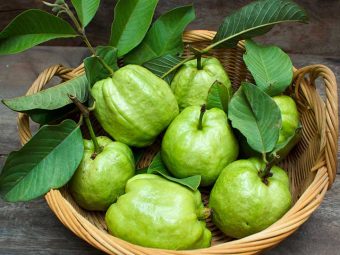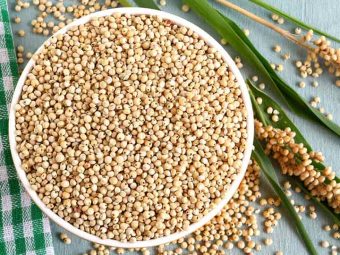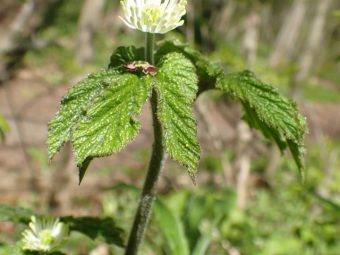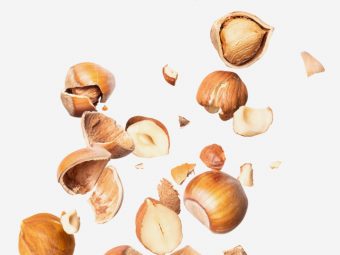[ad_1]
Shiitake is a variety of edible mushrooms native to East Asia. These mushrooms are rich in flavor and have a distinctive taste. People in China first started cultivating shiitake mushrooms about 1,000 to 1,200 years ago. Shiitake mushrooms have many health benefits. They are rich in natural copper, a mineral that supports healthy blood vessels, bones, and immune health. They also have anti-inflammatory properties, and the protein they contain comprises all 18 amino acids. This article provides information about the nutritional facts, health benefits, and potential risks of shiitake mushrooms.
What Are Shiitake Mushrooms?
Shiitake mushrooms are smaller than regular mushrooms. Their caps measure about 10 to 20 centimeters in diameter, and are attached to thin stems. The color of the cap is light to dark brown and has a wide, umbrella-like shape with a characteristic curled rim. When cooked, shiitake mushrooms release a garlic-pine aroma and have a savory, earthy, and smoky flavor.
Shiitake mushrooms, classified as Lentinula edodes, are the second most common type of edible mushrooms in the world after the button mushrooms. They are members of the Marasmiaceae family. They have been used in traditional medicine to reduce symptoms of the common cold, increase energy, and ward off hunger.
Shiitake mushrooms were grown on deadwood logs in the olden days, which was a time-taking process. Over the past few decades, alternative techniques for cultivating shiitake mushrooms have been developed – which involve the use of waste products like corn cobs and sunflower seed hulls as the growing media.
Shiitake mushrooms are also rich in fiber, vitamins, and minerals. They are a good source of vitamins B and D. They also contain polysaccharides that help reduce cholesterol and boost immunity. In the following section, we will check out the nutrition profile of shiitake mushrooms.
Nutrition Facts Of Shiitake Mushrooms
100 grams of shiitake mushrooms contain the following nutrients (1):
| Energy | 37 kcal |
| Water | 89.7 g |
| Protein | 2.24 g |
| Fiber | 2.5 g |
| Carbohydrates | 6.79 g |
| Glucose | 2.38 g |
| Calcium | 2 mg |
| Sodium | 9 mg |
| Fatty acids, total trans | 0 g |
| Vitamin B6 | 0. 293 mg |
Shiitake mushrooms are a rich source of vitamins, minerals, and other nutrients. Hence, they offer several health benefits. Let us discuss them in the next section.
Health Benefits Of Shiitake Mushrooms
1. May Improve Immune Function
The polysaccharides in the mushrooms, the β-glucans, are well known for their biological activity related to the immune system. Fungal β-glucans are especially beneficial to humans. They stimulate the human immune system and protect against pathogenic microbes, environmental toxins, and carcinogens. They also protect us from infectious diseases (2). β-glucan has been linked to altering the immune system. Lentinan, another compound in shiitake mushrooms, can interact with macrophages, dendritic cells, and other immune cells. Shiitake mushrooms have also been found to enhance the production of IgA (immunoglobulin A), an antibody that boosts the immune function of cellular membranes (3).
As already discussed, the copper in shiitake mushrooms is essential for optimal innate immune function. Deficiency of copper may increase one’s susceptibility to bacterial infections (4).
Anthony Puopolo, a certified physician, says shiitake mushrooms do an excellent job of reducing inflammation and supporting immune health. They are known to be high in eritadenine as well, a compound that has been found to reduce cholesterol levels. All in all, shiitake mushrooms are an excellent health choice and are easy to introduce into your diet – whether raw, roasted, sautéed, or any other way that suits your fancy.
2. May Promote Heart Health
Shiitake mushrooms contain bioactive compounds that offer antioxidant defense. They also help prevent oxidation of low-density lipoprotein (LDL, or the bad cholesterol) – and may help reduce the risk of atherosclerosis. The mushrooms also contain α-tocopherol (vitamin E), oleic acid, linoleic acid, ergosterol, and butyric acid that may function as anti-atherosclerotic agents (5).
Studies also support the beneficial impact β-glucans can have on human health (6). Edible mushroom consumption may have beneficial effects on lipid profiles too. Mushrooms may help change some metabolic markers like low-density lipoprotein (LDL) cholesterol, high-density lipoprotein (HDL) cholesterol, total cholesterol, and triglycerides. Moreover, consumption of edible mushrooms is mainly associated with reducing mean blood pressure (7).
3. May Reduce Risk Of Cancer
Mushrooms possess antioxidant, hypocholesterolemic, anti-tumor, anti-cancer, immunomodulatory, anti-allergic, nephroprotective, and antimicrobial properties. The active components in mushrooms responsible for their anti-cancer properties are lentinan, kristin, and hispolon. Shiitake mushrooms are rich in lentinan, which is known to suppress leukemia cell proliferation. The ethanol extract of this mushroom significantly decreased the cell proliferation cancer cells (8).
Mushrooms have shown anti-cancer properties against breast, bladder, colon, lung, and prostate cancers (9). Shiitake mushrooms are regarded as medicinal foods and are used in traditional Chinese medicine for their anti-cancer properties.
Further research also supports the anti-cancer effects of lentinan in shiitake mushrooms (10).
4. May Promote Skin Health
Ethanolic extracts of shiitake mushrooms possess anti-inflammatory, anti-tyrosinase, antioxidant, and antibacterial properties. These extracts are also often introduced to base cosmetic creams.
The antioxidant capacity of shiitake mushrooms can help fight oxidative stress and offer anti-aging benefits (11). For many years, people all over the world have been using wild mushrooms in their cosmetics. Today, several types of mushrooms are introduced in topical creams, lotions, ointments, serums, and facial preparations. These mushrooms include Shiitake (Lentinula edodes), Maitake (Grifola frondosa), Reishi or Lingzhi (Ganoderma lucidum), and Fu Ling (Wolfiporia extensa). They are known for their antioxidant, anti-aging, anti-wrinkle, skin whitening, and moisturizing effects (12).
Mushroom extracts, including that of shiitake mushrooms, also possess anti-irritant properties. Shiitake mushrooms contain polysaccharides, triterpenes, proteins, lipids, phenols, and cerebrosides. These serve as anti-irritants and antioxidants and stimulate the skin’s natural renewal process. They also offer protection against photoaging and help improve skin elasticity. The natural shiitake complex inhibits elastase activity and eventually slows down wrinkle formation (13).
5. May Improve Bone Health
Shiitake mushrooms contain a decent amount of vitamin D, which is known to improve bone mineral density as it has significant bioavailability (14). Vitamin D is responsible for stimulating the synthesis of calcium, helping transport proteins in the small intestine, enhancing the absorption of dietary calcium, and reducing the risk of osteomalacia in adults and rickets in children (15).
A combination of extracts from L. edodes (shiitake mushrooms) and G. frondosa may reduce bone loss in the lumbar spine. L. edodes may also promote osteoblasts (cells that support new bone formation) and decrease lumbar spine bone loss. Hence, mushroom extracts can be considered a preventive treatment and/or a supplement with regard to bone health (16).
6. May Have Antiviral And Antibacterial Activity
Shiitake mushroom extract exhibited antimicrobial activity against 85% of the organisms, 50% of which were yeast and mold species (17). Mushrooms require antibacterial and antifungal compounds to survive in their natural environment. These antimicrobial compounds are isolated from many mushrooms and could be of benefit to humans (18).
Mushrooms can be used as an alternative to natural sources of new antimicrobials. Mushroom extracts have phenolic compounds that exhibit antioxidant and antimicrobial activity (19).
Mushrooms can be termed as nutritional foods with many proven benefits. But despite their health benefits, their intake may also have some potential downsides. Learn more in the next section.
Potential Side Effects Of Shiitake Mushrooms
1. May Cause Gastrointestinal Problems
Excess intake of shiitake mushroom powder may lead to eosinophilia and increased gastrointestinal symptoms. Many people refrain from eating shiitake mushrooms due to rashes or abdominal discomfort, and also may develop eosinophilia (20). The mushrooms may also cause bowel obstruction in a few (21).
2. May Cause Allergic Reactions
Consumption of undercooked shiitake mushrooms can cause shiitake mushroom dermatitis or flagellate dermatitis. This rash develops slowly and spreads rapidly over 24 hours. Shiitake dermatitis is a skin eruption that shows whiplash marks and occurs after consumption of raw shiitake mushrooms. It occurs due to the toxic reaction to lentinan (22).
Other allergic symptoms include linear erythematous eruptions with papules. Dermatitis may occur through ingestion of mushrooms or from handling, which can result in contact dermatitis (23).
However, most of the mentioned side effects are rare and mostly occur due to improper cooking methods or handling. Hence, you can enjoy these delicious mushrooms with your meal. But can you eat them daily?
Can I Eat Shiitake Mushrooms Every Day?
Yes, but in limited quantities. One can take ½ a cup of shiitake mushrooms every day to reap their benefits. Ensure the mushrooms are cooked properly. Do not microwave them (as it may increase the risk of allergic reactions).
Key Takeaways
- The copper in shiitake mushrooms boosts immunity.
- The mushrooms are promote bone health, thanks to their vitamin D.
- However, excess intake may cause allergies and gastrointestinal issues.
- Cook and handle the mushrooms properly to avoid side effects.
https://www.youtube.com/watch?v=v=tE2PbiQV3So%20
Conclusion
Mushrooms are a tasty addition to many cuisines and are known for their unique taste. Shiitake mushrooms are a rich source of many beneficial nutrients that offer important health benefits. However, improper cooking methods or handling may cause allergic reactions and gastric problems in some. Excess intake may also cause side effects. Hence, caution is advised. Eating them in moderation regularly will help you reap their benefits.
Sources
Articles on StyleCraze are backed by verified information from peer-reviewed and academic research papers, reputed organizations, research institutions, and medical associations to ensure accuracy and relevance. Read our editorial policy to learn more.
- Mushrooms shiitake raw
https://fdc.nal.usda.gov/fdc-app.html#/food-details/169242/nutrients - Edible Mushrooms: Improving Human Health and Promoting Quality Life
https://www.ncbi.nlm.nih.gov/labs/pmc/articles/PMC4320875/ - Consuming Lentinula edodes(Shiitake) Mushrooms Daily Improves Human Immunity: A RandomizedDietary Intervention in Healthy Young AdultsXiaoshuang Data Joy M. Stanilkaa Cheryl A. Rowena Elizabeth A. Estevesb Carmel
https://www.researchgate.net/publication/274901164_Consuming_Lentinula_edodes_Shiitake_Mushrooms_Daily_Improves_Human_Immunity_A_Randomized_Dietary_Intervention_in_Healthy_Young_Adults - The Role of Copper and Zinc Toxicity in Innate Immune Defense against Bacterial Pathogens*
https://www.ncbi.nlm.nih.gov/labs/pmc/articles/PMC4521016/ - Lentinula edodes (shiitake mushroom): An assessment of in vitro anti-atherosclerotic bio-functionality
https://www.sciencedirect.com/science/article/pii/S1319562X16000231 - Edible Mushrooms and Beta-Glucans: Impact on Human Health
https://www.mdpi.com/2072-6643/13/7/2195/htm - Mushroom Consumption and Cardiovascular Health: A Systematic Review
https://www.amjmed.com/article/S0002-9343(20)31092-5/fulltext - Recent developments in mushrooms as anti-cancer therapeutics: a review
https://www.ncbi.nlm.nih.gov/labs/pmc/articles/PMC3339609/ - Mushroom consumption and incident risk of prostate cancer in Japan: A pooled analysis of the Miyagi Cohort Study and the Ohsaki Cohort Study
https://www.ncbi.nlm.nih.gov/labs/pmc/articles/PMC7154543/ - Astragalus and Shiitake as an Integrated Therapeutic Approach
https://www.ncbi.nlm.nih.gov/pmc/articles/PMC8401741/ - Development of Mushroom-Based Cosmeceutical Formulations with Anti-Inflammatory Anti-Tyrosinase Antioxidant and Antibacterial Properties
https://www.ncbi.nlm.nih.gov/labs/pmc/articles/PMC6274557/ - Mushroom Cosmetics: The Present and Future
https://www.mdpi.com/2079-9284/3/3/22/htm - Cosmetic Benefits of Natural Ingredients: Mushrooms Feverfew Tea and Wheat Complex
https://jddonline.com/articles/dermatology/S1545961613S0133X - Effects of vitamin D 2-fortified shiitake mushroom on bioavailability and bone structure
https://pubmed.ncbi.nlm.nih.gov/30732553/ - A Review of Mushrooms as a Potential Source of Dietary Vitamin D
https://www.ncbi.nlm.nih.gov/labs/pmc/articles/PMC6213178/ - Mushroom Extracts Decrease Bone Resorption and Improve Bone Formation
https://www.researchgate.net/publication/309102411_Mushroom_Extracts_Decrease_Bone_Resorption_and_Improve_Bone_Formation - Antimicrobial properties of shiitake mushrooms (Lentinula edodes)
https://www.researchgate.net/publication/23716171_Antimicrobial_properties_of_shiitake_mushrooms_Lentinula_edodes - The Pharmacological Potential of Mushrooms
https://www.ncbi.nlm.nih.gov/labs/pmc/articles/PMC1193547/ - Comparative antioxidant and antimicrobial properties of Lentinula edodes Donko and Koshin varieties against priority multidrug-resistant pathogens
https://www.sciencedirect.com/science/article/pii/S102691852030055X - Eosinophilia and gastrointestinal symptoms after ingestion of shiitake mushrooms
https://pubmed.ncbi.nlm.nih.gov/9600497/ - Two cases of small bowel obstruction due to a shiitake mushroom
https://academic.oup.com/gastro/article/7/4/298/4037468 - A characteristic rash caused by Shiitake mushrooms – An emerging concern?
https://www.ncbi.nlm.nih.gov/labs/pmc/articles/PMC8222744/ - Shiitake Mushroom Dermatitis: A Review
https://www.researchgate.net/publication/307084866_Shiitake_Mushroom_Dermatitis_A_Review
Related
LATEST ARTICLES
[ad_2]

















